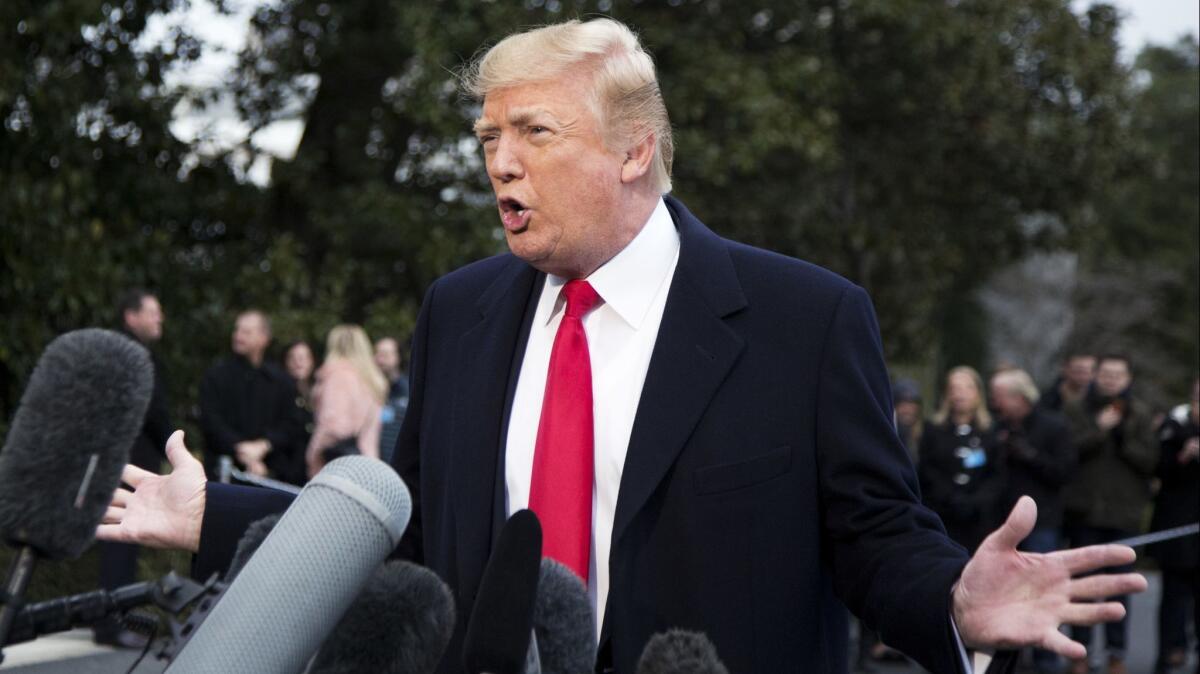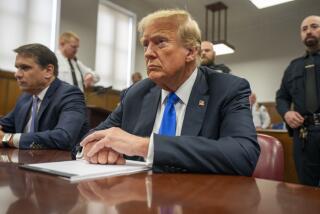Editorial: Pardoning Flynn and Manafort would be grounds for an impeachment investigation

It’s impossible not to be alarmed by reports that one of President Trump’s lawyers discussed the possibility of presidential pardons with lawyers for former national security advisor Michael Flynn and Paul Manafort, who served as Trump’s campaign chairman. Even the hint that the president is considering pardons could undermine the investigation being led by special counsel Robert S. Mueller III.
That Trump might use the promise of a pardon to offer a lifeline to his former aides — and possibly persuade them not to testify against him — isn’t an entirely new concern. Trump has relentlessly criticized the Mueller investigation, and he already has abused his clemency authority to grant an unconscionable pardon to a political supporter, former Arizona Sheriff Joe Arpaio. “Sheriff Joe,” as Trump calls him, was convicted of criminal contempt for violating a court order to stop racially profiling Latinos.
But speculation that Trump might try to use his pardon power to obstruct Mueller’s investigation increased this week when The New York Times and the Washington Post reported that John Dowd, one of Trump’s lawyers, had talked about possible pardons last year with lawyers for Manafort and Flynn.
Dowd, who resigned from Trump’s legal team last week, has denied discussing pardons with lawyers for the president’s former aides. “There were no discussions. Period,” he told The New York Times.
After the reported discussions between his lawyer and Dowd, Flynn pleaded guilty to lying to the FBI and agreed to cooperate with Mueller’s investigation, which apparently now extends beyond possible collusion of the Trump campaign with Russia to include the possibility that Trump obstructed justice. Rick Gates, an associate of Manafort’s and former deputy chairman of the Trump campaign, also has submitted a guilty plea and is cooperating with Mueller’s investigators.
Mueller must be allowed to proceed with his investigation, and the president should not hinder the course of justice under the guise of showing mercy.
Manafort, however, is not cooperating with Mueller. He has been indicted on several counts of fraud, conspiracy, money laundering and conspiracy and has pleaded not guilty. If he and his lawyer thought that a pardon was in the offing, it might explain why he was unwilling to cooperate.
The president’s constitutional power to grant pardons for “offenses against the United States” is broad and generally thought to be unreviewable by the courts. Congress is also powerless to reverse pardons, though President Bill Clinton’s eleventh-hour pardon of fugitive financier Marc Rich led to an inquiry by the House Government Reform Committee.
But even if the president has the unfettered right to issue pardons, if he exercises that power in an attempt to silence potential witnesses against him that would constitute obstruction of justice in our view.
Trump, who has protested his innocence of any collusion with Russia or other wrongdoing, should make it clear that he won’t use his pardon authority to abort or undermine Mueller’s investigation. So far he has not made that unequivocal assurance. Indeed, last December, after Flynn’s guilty plea, the president said “I don’t want to talk about pardons for Michael Flynn yet. We’ll see what happens.”
What should happen is this: Mueller must be allowed to proceed with his investigation, and the president should not hinder the course of justice under the guise of showing mercy. If Trump attempts to use the pardon power to short-circuit Mueller’s investigation, Congress should immediately launch an impeachment investigation.
Follow the Opinion section on Twitter @latimesopinionand Facebook
More to Read
A cure for the common opinion
Get thought-provoking perspectives with our weekly newsletter.
You may occasionally receive promotional content from the Los Angeles Times.










